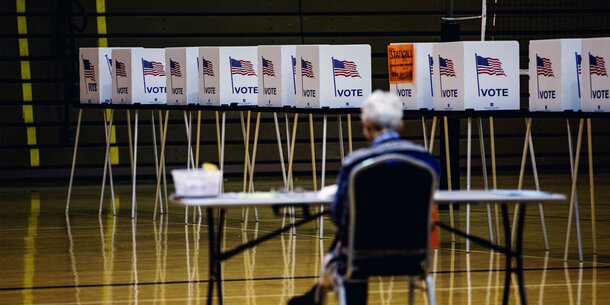“I vote. I vote religiously.”
Toby Cole, 51, a lawyer from Harris County, Texas, has voted in every major election since he turned 18.
For as long as he has been eligible to cast a ballot, Cole has also been a quadriplegic. An accident at his high school graduation party left him paralyzed from the neck down. In each election, he’s voted in person at the polls with assistance from a person of his choosing. But when last year’s election season came around, his ability to receive help became all the more strenuous. In 2021, Texas lawmakers passed a wide-ranging voter suppression law, Senate Bill 1. The law made voting even more challenging in a state where it was already difficult — particularly for Black and Latino voters and for people with disabilities, limited English proficiency, or limited literacy.
S.B. 1 imposes new requirements and penalties for vote assisters, deterring volunteers from aiding voters at the polls. It also makes it a crime to compensate or receive compensation for helping people vote by mail, which prohibits, for example, civic organizations from supporting community members who have trouble filling out the forms. Under one provision of the law, a vote assister must sign an oath affirming that the voter qualifies to receive help “under the penalty of perjury” — a requirement that Cole called “offensive.”
Cole served as a witness in LUPE v. Texas, a federal lawsuit challenging S.B. 1. The Brennan Center, alongside the Mexican American Legal Defense and Educational Fund and other co-counsel, are representing a range of Texans in the case, including election workers, community groups, civil rights and voting organizations, and faith-based groups. Attorneys delivered closing arguments in the trial on Tuesday.
Testifying in a courtroom in San Antonio, Cole explained, “If I want to go buy a ticket to go to a concert, I don’t have to reveal to somebody what my disability is to get access or to get assistance under the [Americans with Disabilities Act].” But under S.B. 1, he said, “I have to share with somebody what my private health information is if I need assistance to vote.”
S.B. 1 is part of an unyielding wave of antidemocracy measures enacted across the country following the 2020 election. But it stands apart for its sheer volume of restrictive and discriminatory provisions. Brennan Center research found that one provision in S.B. 1 — which required voters to put either the last four digits of their driver’s license number or social security number on their mail ballot application and mail ballot— led to unprecedented disenfranchisement with major racial disparities in Texas’s 2022 primaries. The judge in the case has already indicated that he will block that provision for violating at least one federal law.
Texas is also not the only state where voter assistance is under assault. It is one of at least eight states — including Arkansas, Florida, Georgia, Iowa, Kansas, Mississippi, and Montana — that have enacted new voting laws since 2021 that establish or increase criminal penalties and fines for individuals and groups that assist voters.
Why is voter assistance in the crosshairs?
The Voting Rights Act of 1965 guarantees the right to assistance to every voter that needs help reading a ballot or due to a disability. That right applies to all aspects of voting — from voter registration, to casting a ballot, to having that vote counted properly — whether on Election Day or during early voting. Federal law also grants voters the right to receive assistance from a person of their choice.
But during the 2020 election, when lies, misconceptions, and conspiracy theories undercut trust in elections, voter assistance, too, was besieged by falsehoods. For example, election deniers falsely equated voter assistance to illegally or illegitimately tampering with absentee ballots to suggest that laws that allow assistance for voters perpetuate election fraud.
These false claims of fraud and rigged elections, in part, fueled state legislatures across the country to pass legislation that added more barriers to the voting process, including targeting voter assistance.
But legal and legitimate assistance to voters casting a ballot is not evidence of fraud. It provides voters with disabilities or limited English proficiency or literacy access to the voting process, which can already be an arduous experience. For Cole, voting involves a caregiver driving him to a curbside voting site, a poll worker taking down his information, and waiting for an election official to bring a voting machine to him so that he can cast his ballot. If he’s lucky, he said, the process to vote takes “45 minutes.” Much like other routine activities that take people without disabilities 15 to 20 minutes, for Cole, tasks may often take “an hour or two,” if not more.
Since S.B. 1 added penalties for vote assisters, Cole testified that he must choose between potentially putting somebody whom he chooses “in harm’s way” and ensuring he has “the things that I need to make sure I can vote properly.” The provisions in S.B. 1 that add obstacles for him and other Texans with disabilities can be consequential. “Every time you put even one little road bump or one little barrier in front, it just makes it that much harder, and so you don’t do it,” he explained.
In the face of one more hurdle — or even potential legal jeopardy — the cost of voting may be too high to exercise.




